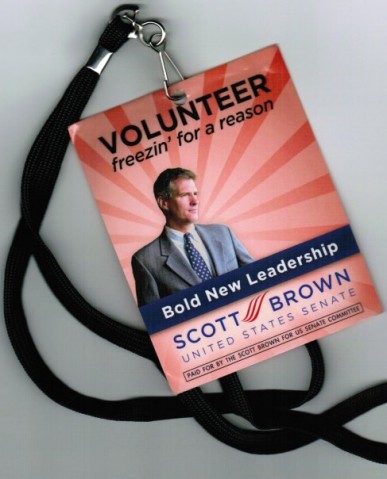For the second time in the last three meetings, our scheduled speaker had to bail out on us at the last minute. If this keeps up our club is going to start getting a collective complex.
Actually, it was a weather-related incident which kept U.S. Senate aspirant Corrogan Vaughn at home, so we’re hopeful in rescheduling his appearance before September’s primary. Undaunted, we began as always with the Lord’s Prayer and Pledge of Alllegiance, both led by WCRC president Marc Kilmer, who also noted in his opening remarks that “Massachusetts went well.” So the year is off to a good start.
I read the minutes I compiled last month as the secretary pro tem, and the Treasurer’s report was related by our regular secretary, Dave Parker. We have a “significant amount” of money we can use for 2010, and opined that it was more than our Democrat counterparts have. (The trick will be to spend it wisely.)
Marc then regained the speaker’s role, appealing for members to pay their 2010 dues and noting that we had the preliminary meeting to discuss 2010 election strategy last month. This will be an ongoing effort.
The January meeting also begins the process of selecting 2010 officers, and with one exception all of the 2009 officers were willing to return to their positions. Fortunately we have a volunteer for a replacement, so unless nominations come from the floor during February’s meeting the WCRC officer slate will be essentially unchanged.
Dustin Mills gave the Young Republican report for YR president Mark Biehl, who was having weather-related problems of his own. They are still in the process of planning two events: their second annual food drive to be held in late March or early April (date to be determined) and hosting the 2010 state Young Republican convention, which Dustin promised would have “significant” guest speakers.
Matt Taffeau of the Salisbury University College Republicans briefly noted his own organization’s recent accomplishments (they are over two dozen strong and have heard from a goodly number of local and state candidates as their recent speakers) and promised a large presence at the Lincoln Day Dinner, which will be held February 6th on the SU campus.
We had a new report from the Republican Women of Wicomico and their president, Shirley Smack. She reminded our group that the RWW would be hosting a lunch with Maryland GOP Chair Audrey Scott on Wednesday, February 3rd at 11:30 a.m. at Brew River in Salisbury. They also have a monthly program which airs on local public access station PAC-14 and are looking for members. By the way, guys can come to the February 3rd luncheon too!
The most lengthy portion of the evening came from the Central Committee report. First, county Chair Dr. John Bartkovich announced our two new members, who were selected after the state convention allowed our ranks to expand. Also, due to the high number of quality people to choose from, we picked two associate members.
And, as noted above, Wicomico County’s Lincoln Day Dinner will be Saturday, February 6th at the Commons at Salisbury University. The fun there begins at 6:30 p.m. and speakers will be Kendal and Bob Ehrlich.
During our tri-county Central Committee meeting earlier this month members came up with several possible topics to use as the overriding messages we’ll encourage local candidates to adopt, and the meeting tonight was used as a focus group to test some of the concepts. Obviously candidates would have their own ideas on how to deal with these issues but the themes our group came up with seemed to resonate well with the group. The only addition was when Joe Holloway brought up the “arrogance” of those in power in both Annapolis and Washington, D.C.
Certainly it was fodder for a lively discussion as we debated the merits of a number of topics, but preferring to stay away from certain issues as part of an overriding message candidates could agree on seemed to be a consensus as well. Eventually we’ll hone these suggestions down and begin with three to four themes…but at this point I won’t tip our hand.
Our final business item came from Woody Willing, who gave the monthly voter registration status and announced our annual Crab Feast would be held about a month sooner than normal. The August 28 date was picked to maximize the number of candidates who would be present as early voting for the primary begins September 4th.
With that being said, our next get-together will occur on February 22nd. Yes, we are planning on a guest speaker and hopefully he or she will be able to attend!


